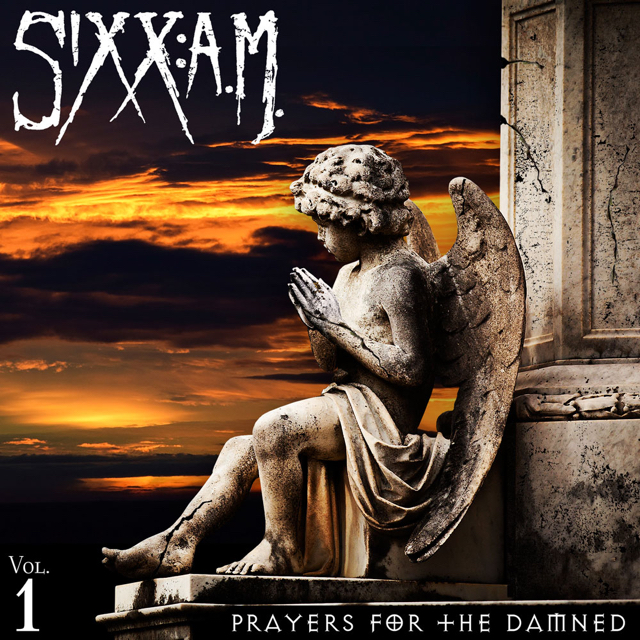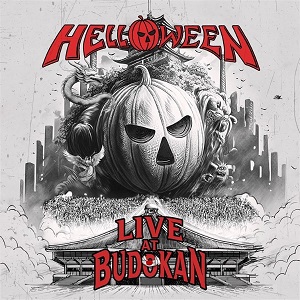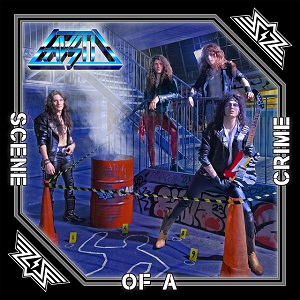SIXX:A.M. – “We’re Finally A New Band”
April 28, 2016, 8 years ago

Never mind The Little Engine That Could, Sixx:A.M. is the side project that grew into a full-fledged, highly respected rock ‘n’ roll band. Back in 2007, Mötley Crüe bassist Nikki Sixx joined forces with guitarist DJ Ashba – who would go on to play with Guns N’ Roses from 2009 to 2015, and vocalist / producer James Michael, to record the soundtrack to his autobiography The Heroin Diaries: A Year In The Life Of A Shattered Rock Star. Nine years later and without any obstacles in their way, the trio has recorded their fourth full-length, a must-hear double album. Prayers For The Damned Vol. 1 will be released on April 29th, with Vol. 2 to follow in October. BraveWords was invited to partake in an exclusive interview with Sixx, Ashba, and Michael; what transpired follows:
Let’s start with the cover art (pictured below) – designed by guitarist DJ Ashba – depicting a cracked statue of an angel with hands in prayer position; obviously tying in nicely with the album title, Prayers For The Damned.
Ashba: “It’s kind of what’s going on around us, the world is in shambles. It’s chaos out there right now. Everybody’s scared, everybody’s angry; they’re sad, fed up, they’ve had it. It’s a cool image because it kind of sums up the music. Vol. 1 – I wanted to design the cover to where it told the whole story by itself, if you never saw or heard Vol. 2 – it tells a complete story. But when you put the two album covers together, it makes a bigger picture; it’s going to be pretty cool.”
Somewhat surprisingly, Sixx:A.M. went into this with the intention of writing and recording a double album.
Michael: “We did. There’s a couple of reasons for it. Number one, we are a band that has a lot to say. Number two, if you really look at what’s been going on over the last ten years with Sixx:A.M., we developed kind of slowly. We didn’t start out as a band; we started out as kind of a project. Somewhere along the line, we finally admitted to ourselves that we were a band. But, these two records mark a turning point for us. These are the first records we’ve ever written and recorded, knowing full well we are a band having a future touring. So we saw this as an opportunity to really introduce the world to what Sixx:A.M. is now. Because we know, even though we’ve had a string of hits, and this is our fourth record; a lot of people don’t really know who we are in-depth. Once people hear these records and see us on tour, they can go back and binge-listen to the other records.
“When we got off the road in April 2015, that’s when we all looked at each other and said, ‘Let’s move this thing forward. Let’s commit 100%.’ You could just sense the energy the first time the three of us got in the room together. We said, ‘Let’s write a double album.’ Let’s write two albums worth of material so we can really give people a lot of music to discover. It was a very intentional thing. A lot of times when bands do double albums, they record one album, it turns out pretty good and they have a few leftover songs; let’s polish these up, do a couple more, and market it differently. I think that’s given double albums a bad reputation over the years. That was certainly not something we were going to stand for. We actually had a very clear intention when we sat down to write both of these records.”

Prayers For The Damned is Sixx:A.M.’s fourth album. Back in 1987 when Mötley Crüe released their fourth album, Girls Girls, Girls, I imagine there was a similar sense of accomplishment, but that’s the only parallel.
Sixx: “I don’t even know about that? It’s kind of hard to… it’s like asking me what it was like for Aerosmith on their fourth record, or Metallica… each band is their own journey. I feel like we’re kind of a band in reverse. We started out as really just a project. As the years went, we became more and more aware of it – playing live was important to us, making albums that were meant to be played live was important to us. It really came to a place with Mötley coming to an end, DJ leaving Guns N’ Roses, and James putting all of his opportunities for production and writing on the backburner – just focusing on this alone and writing two albums that were meant to be played live. We’re finally a new band.”
Upon first glance at the Prayers For The Damned tracklisting, “Better Man” immediately sticks out as that was the name of a huge hit for Pearl Jam in the ‘90s; yet yours is an all-new original and not a cover song.
Michael: “You’re talking to a band that had two hit songs – one was ‘Life Is Beautiful’ and the other was ‘Lies Of The Beautiful People’. We don’t place too much importance on title as far as that goes.”
Ashba: “And I was in a band called Beautiful Creatures.”
Sixx: “You know, somebody once said to me, is ‘Live Wire’ (from Mötley Crüe’s Too Fast For Love album) an AC/DC cover? I never knew AC/DC had a song called ‘Live Wire’.”
Michael: “But that Pearl Jam song is a fantastic song, and I never even drew that comparison. Honestly, this song ‘Better Man’ is one of the deepest, richest songs that we’ve written lyrically. It’s a beautiful song about the inner struggle within this person who has realized he’s reached a point in his life where some decisions he’s made have affected the people he loves the most. It’s kind of a reckoning.”
When you say, “this person,” does that mean it’s not about any of one of the members of Sixx:A.M.?
Michael: “I think that was actually kind of an instinctive response. We tend to characterize ourselves when we’re writing; it helps you be a bit more objective, and write from not just your perspective. Our reason for writing songs is to connect with people on a level where they can see themselves in those songs.”
All of Sixx:A.M.’s lyrics envelop the listeners and unify the fans as one.
Sixx: “We think lyrics are as important as great guitar parts, great vocal parts, great arrangements and songwriting. A lot of bands don’t feel that way; (for them) lyrics are an afterthought. If you want to have longevity with your song, it has to be something you can connect to.”
Michael: “Here’s what I find fascinating about lyrics, and Sixx:A.M. lyrics. When you look at how deeply the songs on Heroin Diaries connected with people – every time we’re out, people come up to us with lyrics to ‘Life Is Beautiful’ tattooed on them, or they say, ‘this song saved my life.’ That song clearly came from this story that was about recovery from heroin addiction. However, it has connected with so many people that I can guarantee you have never even considered taking heroin. Our lyrics take a subject matter that can be very, very specific, but open it up and it becomes poetry for somebody else’s story that may have nothing to do with it. Once we finish writing a song, our involvement in that is done. It goes out into the world and continues to be written again and again by other people who experience it, and it becomes the soundtrack to their lives.”

“Prayers For The Damned” contains some pretty heavy lyrics, for example: ‘Have you ever been abused by someone so brutal that it chills your soul?’
Sixx: “How many times have you read a book, watched a movie, or heard a song and said, I relate to that. I watched a documentary called Cartel Land. ‘Rise’ was finished. I called the guys (James and DJ) and said, you’ve got to watch this documentary – it’s ‘Rise’. It’s about a cartel infiltrating and taking over villages and small cities, then big cities in Mexico. It had these young kids talking about how it’s their only way out of poverty – they had nothing to live for. They’re doing human trafficking and drug trafficking into America. Then, internally, there’s a guy who goes to the town square with a gun and a box of white shirts and says, ‘who wants to stand with me and rise up and push these people out?’ So ten men put on white shirts, went and found these young guys who were cooking the drugs and pushed them out of the village – victory. So they went to the next town – 20 men. Next thing you know, it was 25,000 men in white shirts pushing the cartel out. That’s what rising up is about. That’s what lyrics can do. We wrote a song about something specific, and then I saw a documentary and went, oh my god it’s about that. Yet I get information on social media – ‘I needed this song right now. I needed to stand up for myself.’ I don’t know what it is they’re standing up for? It could be a relationship, whatever. But lyrics take on a life of their own.”
Michael: “I think if you were to ask the three of us what any one Sixx:A.M. song is about, you would get three different answers.”
“You’ve Come To The Right Place” is also open to interpretation. Where is the right place? Is it a physical address, an emotional state of mind?
Ashba: “It could be anything. It could be our concerts.”
Sixx: “Is it the red door you open and there’s an evangelist who says, ‘you’ve finally come to the right place.’ I heard that before and it’s like whoa – that doesn’t sound healthy to me. Or is it something darker? Have you come to the wrong place and you’re just being enticed in?”
Michael: “When we were on tour last year, we did 19 sold out shows on our headlining tour. Every one of those shows, for us, felt like a spiritual thing.”
Ashba: “I felt that more than ever when we were playing live. That was actually the determining factor at that point, it was the tipping point for me to where I was doing the wrong thing – I’ve got to give this all my attention. I feel like our crowd is a congregation. They congregate for one purpose and that’s to rise with us to a higher place, and that’s to feel the power of the music.”
As a guitarist in Guns N’ Roses, even though you were playing absolute classic songs such as “Welcome To The Jungle” and “Sweet Child O’ Mine”, it must be a lot more satisfying to go onstage and play songs that you were a part of writing and recording.
Ashba: “There’s not even a comparison. And with these (Sixx:A.M.) songs, I can’t tell you, there’s no amount of money… when you feel your notes connecting with people in the crowd, and you see tears in their eyes, the emotion – money can’t buy that. It’s a powerful thing.”
Michael: “This is the problem with having a double album – two records worth of material. I want to be clear about this, the songs on Vol. 2, we are literally anxious. It kills us that we can’t release them all at the same time. The second record is so strong! We’re just chomping at the bit to release it.”
Sixx: “But it would be a disservice to release 22 songs at once. You’re a guy who listens to music all the time; and you would have a hard time getting through all of it. And the last songs suffer! It would be the same feeling I had when I watched The Revenant (with Leonardo DiCaprio). The last 30 minutes I was like, I love this movie but God, please can someone die and end?”
Michael: “I have another analogy. It’s like on Christmas morning when a little kid comes down to the Christmas tree and there’s 20 presents; you definitely don’t give him the best present first. Because no matter what, he’s thinking, what’s in these other ones? We want people to process these things; these are very rich stories and it’s going to take some time to absorb.”
Ashba: “The cool thing is the way we recorded them. Personally, I’ve never put as many guitar tracks down on each song, and there’s a reason for that. The way James produced and mixed this thing, we wanted to give people two different listening experiences. You can crank it up and it sounds fucking awesome! But put on headphones and it’s like a 3D experience. You can hear the layers; it’s really trippy.”

The production on Prayers For The Damned Vol. 1 is very full, especially compared to previous album Modern Vintage.
Sixx: “That was purposeful. There’s no mistakes in Sixx:A.M.”
Michael: “It was really important that we showcased the personalities of these three musicians. In the records we’ve done in the past – which we’re extremely proud of, and always will be – there was a lot of exploration. These records reflect what Sixx:A.M. has become. The three musical personalities in this band are very strong. There are moments where you’re just absolutely absorbed by Nikki’s bass – the sound and the grind; you see him when you’re listening to it. Same thing with DJ – you see the sensitivity, the drama. These records are very visual, and that was intentional. We’ve also brought our touring band (drummer Dustin Steinke, backing vocalists Melissa and Amber) into the studio, because we wanted that transition from studio to stage to be seamless; and it’s going to be. These records are how Sixx:A.M. sounds.”
Was it easy to decide on Prayers For The Damned as the title for this body of work?
Michael: “The title itself, Prayers For The Damned summed up the heart of this record. But I believe it also sums up the heart of Sixx:A.M.’s approach toward lyric writing and towards messaging. It’s that inherent struggle between good and evil. There’s so much of that going on in the world right now, on so many different instances. That song in particular really exemplified it, in the feel and grandness of it, the heaviness of the lyric. There’s even a reference to reaching up to God. We are certainly not a religious band by any stretch, and it’s not about that. It’s about the fact that you are being pushed to this point of desperation where you are grasping for anything. And I think we all do that, whether we believe in God or not. We all have experienced that moment of fear or desperation where even if you don’t believe, you kind of wish you did. I find that to be a beautiful moment about that song. You get the feeling that this person has been pushed to the brink, pushed to the point where he’s questioning everything.”
Sixx: “I was reading some Bukowski and he had a collection of poems called Pleasures Of The Damned. I had been in Paris, I went to The Catacombs, and it said something about prayers. Something was floating in there, and then one day one of us said, Prayers For The Damned, and it just exploded. If I had not gone to Paris, not gone to The Catacombs, not seen that writing on the wall, and not been reading the book, it might have been called something else.”
Michael: “It’s such a Sixx:A.M. title. And we started thinking of all of these songs as being prayers, we really did. Very loosely, that’s how we imagined this thing. Not all prayers are good. Not all prayers are positive messages at first.”
Ashba: “And how do they start every sermon? Rise.”
(Photos by Dustin Jack)











